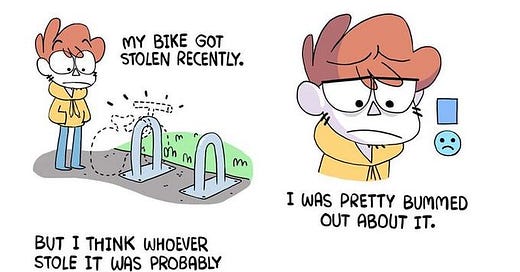Conservatives do not have a monopoly on fear of crime
As a literal-minded person, I am once again asking for connotation not to completely supplant denotation
Happy New Year.
The other day, I saw a screenshot of this tweet on Instagram:
American conservatism just doesn’t appeal to me because I’m not scared of everything.. not scared of immigrants, crime, using public transportation, cities. I’m interested in other people and like talking to them. Even if someone is weird it doesn’t really bother me.
I commented that I found it very strange to assert that you're not scared of crime. Crime is bad. All things being equal, no one would choose to be a victim of crime. Of course some people are more scared of crime than they really should be, but that's a far cry from saying that any amount of fear of crime is wholly unjustified. I may have compared the tweeter to Bike Cuck.

People in the comments clowned me. "Admitting you're afraid of general crime and calling someone else a cuck is a bold stance for someone so pathetic." "If you live your life in constant fear that 'someone' is gonna suddenly commit a crime against you every time you go out in public, you have agoraphobia and should get therapy." "Do you want the powice offiew to tuck you in and wead you a night night story?"
Nowhere in the comment did I claim that I live in constant fear of being a victim of crime: I merely stated that it's silly to claim to not to be afraid of crime at all. It's a weird non sequitur: "you assert that it's not unreasonable to experience some degree of fear of crime - ergo you are a bootlicker who worships police officers." It's also strange to be accused of agoraphobia by someone who I can only presume was an enthusiastic supporter of lockdowns.
I found the tweet strange, in its conception that "being afraid of crime" is a trait unique to (American) conservatives. Many of the canonical beliefs associated with (American) progressivism also entail fear of particular types of crime (perhaps even fear vastly out of proportion to their likelihood of occurring). Rape, sexual assault and sexual harassment (including on college campuses) are all types of crime. School shootings are crimes. Hate crimes are crimes (the hint is in the name). Many kinds of police brutality are crimes, as Derek Chauvin learned to his chagrin. In many jurisdictions, revenge porn and certain kinds of cyberbullying are crimes. If you're afraid of any or all of these happening to you or your loved ones, you are afraid of crime, by definition.1
Moreover, from a statistical perspective, it makes far more sense to be afraid of crime in general than to be afraid of any particular subtype of crime. This is an observation in statistics that many find counterintuitive called the conjunction fallacy, the erroneous belief that the probability of A and B being true is higher than the probability of just A being true, as illustrated by this classic example:
Linda is 31 years old, single, outspoken, and very bright. She majored in philosophy. As a student, she was deeply concerned with issues of discrimination and social justice, and also participated in anti-nuclear demonstrations.
Which is more probable?
Linda is a bank teller.
Linda is a bank teller and is active in the feminist movement.
Many people answer 2, which contradicts a basic law of probability. If the probability of A is X%, and the probability of B is Y%, then assuming A and B are independent events, the probability of either A or B is X%+Y%; while the probability of A and B happening is X% x Y%. Therefore, [probability of either A or B occurring] > [probability of A occurring] > [probability of A and B occurring], for all independent events A and B. Ergo, it cannot be more likely for Linda to be a bank teller and a feminist than for her to be only one or the other.





